Euronews Green brings you the latest updates from the UN climate conference in Baku, Azerbaijan.
Follow along with our live coverage of COP29 here. From our team at home and in Baku we'll be sharing the biggest news from day 11 of the UN climate summit.
COP29 has struck a last-minute deal for at least $300bn a year in climate funding by 2035 for developing countries.
Earlier today, talks were on the brink of collapse after developing countries walked out, temporarily suspending negotiations on the climate finance text.
The Least Developed Countries (LDCs) bloc and Alliance Of Small Island States (AOSIS) walked out because they didn't want to engage with a rough draft which reportedly contained a new core figure of $300 billion a year (up from the $250 billion in Friday's official draft text).
They said they wanted a guaranteed 30 per cent of climate finance in the deal. One source told Euronews the G77 and China wanted at least $500 billion a year.
"We have all been working very hard over the past two weeks and I know that none of us want to leave Baku without a good outcome," COP29 President Mukhtar Babayev told the plenary as it kicked off just after 8 pm local time on Saturday.
"The eyes of the world are rather focused on us however time is not on our side. I ask you to now step up your engagement with one another."
The final plenary was then adjourned at around 9:30 pm without the all-important decision on climate finance. And then again just after midnight.
The Presidency did manage one decision - on Articles 6.2 and 6.4 of the Paris Agreement. It is a deal that will pave the way for country-to-country carbon trading and the creation of a regulated global market.
In the middle of the night, countries agreed a deal which will inject at least $300 billion a year in climate cash by 2035 for poor countries. It was met with applause in the plenary but few countries were truly happy with the final text.
India accused the presidency of gavelling it through the "paltry sum" without hearing the country's opposition to it. Nigeria called the figure a "joke". And Malawi said that for LDCs it was "not ambitious".
EU Climate Commissioner Wopke Hoekstra was more positive saying the result was "exceptionally important".
UN climate chief Simon Stiell said, "It has been a difficult journey, but we’ve delivered a deal."
"This new finance goal is an insurance policy for humanity, amid worsening climate impacts hitting every country. But it only works if the premiums are paid in full, and on time. No country got everything they wanted, and we leave Baku with a mountain of work still to do."
Find all of our COP29 coverage from our team in Baku and across Europe here.

 ${title}
${title}
Live ended
We're wrapping up our live coverage for tonight as it is getting very late.
At the close of the two-week COP29 summit, countries adopted a deal for at least $300 billion a year by 2035 for developing nations. It came after a tense 48 hours where talks nearly collapsed as developing countries walked out of the negotiating room.
The deal was finally gavelled in the early hours of the morning but divisions still remain over whether it was ambitious enough.
See our live blog below for a timeline of how it happened.
UN secretary general António Guterres says:
"COP29 comes at the close of a brutal year – a year seared by record temperatures, and scarred by climate disaster, all as emissions continue to rise.
Finance has been priority number one.
Developing countries swamped by debt, pummelled by disasters, and left behind in the renewables revolution, are in desperate need of funds.
An agreement at COP29 was absolutely essential to keep the 1.5 degree limit alive. And countries have delivered.
I had hoped for a more ambitious outcome – on both finance and mitigation – to meet the great challenge we face.
But this agreement provides a base on which to build.
It must be honoured in full and on time. Commitments must quickly become cash. All countries must come together to ensure the top-end of this new goal is met."
More comments coming in on the final finance deal:
“The supposed ‘COP of climate finance’ has turned into the ‘COP of false solutions’. The terrible deal on finance destroys the notion of historical responsibility of the rich big polluting countries and pushes private debt creating finance," says Kirtana Chandrasekaran from Friends of the Earth International
"Global North countries are no longer obligated to provide finance to the Global South as enshrined in the Paris Agreement. COP29 also put a final nail in the coffin, opening the door to the global carbon market and the disastrous impacts for communities and ecosystems. We have seen the impacts of these schemes: land grabs, Indigenous Peoples rights and human rights violations and more.”
Mr Michael Wilkins, executive director and professor of practice at the Centre for Climate Finance and Investment, Imperial College London says the new finance goal is a "disappointingly small step" - but one in the right direction.
“COP29 has helped mainstream the simple fact that rich countries have a historic obligation to help poorer countries cut emissions and cope with extreme weather, and that doing so will benefit every country on earth – the return on investment is safer, more sustainable economies.
“Developed countries now need to step up their commitments to ensure a fair and just distribution of climate finance.”
The statements from countries in the plenary are not as positive about the deal.
Bolivia's negotiator has said it "enshrines climate injustice" and "consolidates an unfair system". He adds that rich nations leave developing countries with very limited resources to meet their climate goals.
Nigeria has called the $300bn a year figure a "joke". The country's representative also objected to the gavelling through of the text saying, “We have a right as countries to decide if we accept this or not. I’m saying we do not accept this."
“It’s 3am and we’re going to clap our hands and say this is what we’re going to do. I don’t think so.”
UN climate chief says it has been a 'difficult journey'
"It has been a difficult journey, but we've delivered a deal," UN climate chief Simon Stiell writes in a post on LinkedIn.
"This new finance goal is an insurance policy for humanity, amid worsening climate impacts hitting every country.
This deal will keep the clean energy boom growing and protect billions of lives. It will help all countries to share in the huge benefits of bold climate action: more jobs, stronger growth, cheaper and cleaner energy for all.
But like any insurance policy – it only works – if the premiums are paid in full, and on time.
No country got everything they wanted, and we leave Baku with a mountain of work still to do.
So this is no time for victory laps. We need to set our sights and redouble our efforts on the road to Belém.
Even so, we've shown the UN Paris Agreement is delivering."
'This has been stage-managed' - India
India has accused the presidency of gavelling through the deal before it had listened to objections.
"We had informed the president we had informed the secretariat that we wanted to make a statement prior to any decision on the adoption but however, and it’s for everyone to see, this has been stage-managed and we are extremely disappointed with this incident," India's representative said.
"We absolutely object to this unfair means of adoption."
The COP29 President said India's object would be noted but the agreement on the deal still stands.
Finance deal gavelled at COP29
The gavel goes down on the finance deal to rapturous applause in the plenary.
It's a deal no one seems happy with but perhaps the celebration is relief that tense negotiations have finally come to an end.
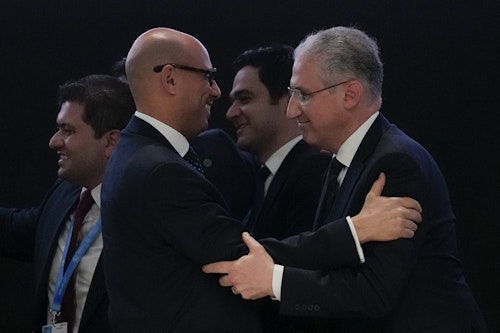
Mukhtar Babayev, COP29 President, right, embraces Simon Stiell, United Nations climate chief, after gaveling a deal for money to curb climate change. Credit: AP Photo/Rafiq Maqbool
The text on gender and climate change - provisions to advance efforts on achieving gender equality and empowering women - has been passed to much applause in the room.
The plenary has restarted once again. Stay tuned.
What about the UAE dialogue?
Following up on the commitment to "transitioning away from fossil fuels" made in Dubai last year, the latest draft of the UAE dialogue on implementing the global stocktake (GST) does not explicitly mention a transition away from fossil fuels.
It instead refers to "paragraph 28" where the previous commitment was made. This could be a sticking point for the EU as the bloc said it would reject any attempts to water down this agreement.
Fossil gas is given a boost too as the text "reaffirms" the role "transition fuels" can play in the energy transition.
There are no mentions of other targets like no new coal or grid improvements either and no solid process to track the implementation of the targets that it does set.
What's in the new climate finance draft text?
The latest draft of the climate finance text increases the $250 billion a year by 2035 figure to $300 billion a year. It also says developed countries will be "taking the lead" but others will have voluntary efforts recognised.
It says this goal needs to come with "meaningful and ambitious mitigation and adaptation action and transparency in implementation".
Language on contributions from developing countries has also been changed. Where the previous draft said "invites", the newest text "encourages developing countries to make contributions on a voluntary basis".
One sticking point could be that parties are able to count "outflows" and "finance" mobilised by multilateral development banks towards the $300bn goal.
It also mentions a very vague "Baku to Belem roadmap" to the wider $1.3 trillion finance goal.
The closing plenary is about to resume. If you want to read the latest draft texts before it begins, you can find them here.
'I'm optimistic we're going to leave Baku with an agreement', Panama's chief negotiator says
Panama's chief negotiator, Juan Carlos Monterrey Gomez tells Euronews reporter Robert Hodgson "I'm optimistic we're going to leave Baku with an agreement."
"It's not going to be the best agreement for either side, but an agreement nonetheless that sets forward a step forward in the right direction."
"Not the complete sprint, but a step towards the sprint that we need to scale up the finance that we need to be able to adapt."
He says there have been "way too many compromises, as always, especially on the developing world side".
"However, we cannot just go back home with nothing. So I'm optimistic that we're going to reach consensus on something that's not going to have anyone completely happy, but is going to be something from where we can build on."
Final plenary to resume shortly
And the plenary has once again been adjourned to resume "later tonight" - an announcement that caused much confusion in the room.
COP29 President Mukhtar Babayev returns to the mic to tell delegates they need 20 to 25 minutes to finalise documents.
Part 2 of the closing plenary is about to begin in Baku.
Here's hoping this one does pull through because it's getting late (early?) and everyone appears to be flagging now. Euronews reporter Robert Hodgson sent these photos from outside the plenary hall.
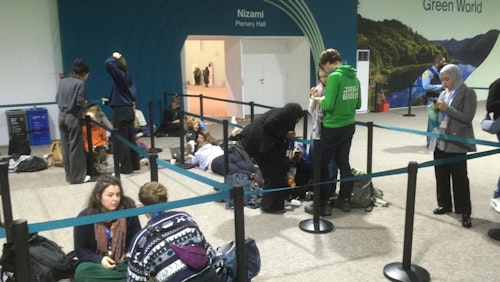
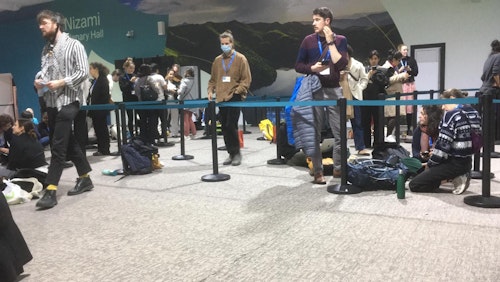
Following the circulation of a new draft finance text, part 2 of the closing plenary has now been scheduled for 12:30am Baku time - around 20 minutes from now. We've had a few false starts so it could still change.
A new text is making the rounds, we're looking over it now. There are a few compromises that should please AOSIS and the LDCs - but seemingly no increase on the earlier $300bn figure.
Evans Njewa, chair of the Least Developed Countries group said a short while ago that they had met with countries like the US, UK and Germany and had "agreed on language" which they had given to the presidency.
"Two or three hours ago, we called for a temporary suspension of the meeting because we felt that the deal that we were being given was not good enough to save our people."
Is a deal in sight?
Brazilian minister of the environment and climate change Marina Silva has told a press conference we are now in a "deadlock".
A few compromises have been made so far on items like carbon markets but some "crucial" issues remain. This includes the just transition, global stocktake - and the headline climate finance deal.
Echoing what she told Euronews last night, the "quantum" or core finance amount developed nations are being asked to provide came "only yesterday". There are, therefore, some issues which still need to be properly addressed.
A final package is apparently in the works. Fiji's delegation chief Biman Prasad told The Associated Press it has been shown to island nations and is something the country can live with.
Not everyone feels the same way, however. Panama's climate envoy Juan Carlos Monterrey said in a post on social media site X that the new draft was negotiated "behind the backs of many countries".
"The text is detrimental to our future and the quantified goal is still very low," he writes.
Are carbon markets a 'dangerous distraction'?
Carbon markets continue to be a controversial topic and we've had some reactions through following the agreement at the plenary.
"With the adoption of lax rules for transparency and accountability, governments now face the real possibility of having created a Paris-sanctioned carbon market that could be worse for people and the planet than the scandal-ridden voluntary carbon markets," says Erika Lennon, Senior Attorney, Center for International Environmental Law (CIEL).
"With the gaveling of standards on methodologies and removals on the opening day of the COP, the Paris Agreement Crediting Mechanism has flung open its doors to removal activities that are nothing more than a dangerous distraction and then failed to ensure additional controls are put in place to keep it from causing harm.
"Going forward it will be essential to ensure this mechanism enforces its standards and, as the text says, considers other relevant environmental agreements that place a moratorium on geoengineering. Paying to pollute will never be a climate solution, and carbon markets will never be climate finance, but rather a climate disaster."
Jannes Stoppel, Political Advisor for Biodiversity and Climate Policy, Greenpeace says it is a "slap in the face" for those surviving extreme weather events around the world.
" Leaders can't offset themselves out of the climate crisis and their responsibility to reduce emissions now in all sectors to mitigate breakdown of climate tipping points.
"A new study shows that very few of the so far issued carbon credits constitute real emission reductions. And nobody knows what the weak fossil fuel compensation rules here developed under the influence of thousands of fossil fuel and abatement technology lobbyists, will really help reduce emissions.
"Really, the time for offsets is over. Trading carbon budgets instead of reducing emissions is a dangerous gamble against the time - time we do not have to address increasing runaway climate change."
'What the final outcome will be, we don't know' say small island states
Euronews reporter Robert Hodgson managed to grab AOSIS chair Cedric Schuster after the plenary to ask where things are at with the climate finance deal.
"We want to work on language to [get to] something that would be acceptable to us but we will have to see," he said.
"What the final outcome will be, we don't know."
After AOSIS walked out of a meeting earlier, Schuster tells Euronews they have been given a chance to "relook" at drafts of the finance text.
"I made our suggestions to it but it's still...far away from what we want for our islands."
What is Article 6 and why is it controversial?
A little-known part of the Paris Agreement to curb global warming has been thrust into the spotlight at COP29: Article 6. Governments have just reached a deal on this at the summit in Baku
This section of the deal concerns a carbon markets system, which would enable nations to produce pollution if they offset emissions elsewhere by buying carbon credits. It is controversial and has been a big sticking point at previous climate summits, as some parties fear it risks undermining the urgent need to cut global emissions.
In the past, carbon trading has also earned a bad reputation due to fraud and bad outcomes. Some are concerned that the agreement lacks adequate protections for human rights and undermines the goals of the Paris Agreement, rather than supporting them. Others worry carbon trading could take the place of genuine, much-needed climate finance commitments.
Carbon markets approved at COP29
The plenary has just been adjourned until later this evening.
There's still no decision on the key climate finance deal but during that confusing mass of proceedings, governments reached an agreement on carbon markets.
Articles 6.4 and 6.2 were adopted to much applause in the plenary. They will pave the way for country-to-country carbon trading and the creation of a regulated global carbon trading market to reach Paris Agreement targets. There are still details and technical rules to be sorted out which will happen in 2025.
COP30 in Belem will be the 'COP of COPs' says Brazil
Marina Silva, the Brazilian minister of the environment and climate change, tells the plenary that COP30 in Belem will be the "COP of COPs" with "no more time to lose".
She says Baku has been a "difficult" experience, urging the summit to come to a "minimally acceptable result".
"It's crucial that before we arrive at COP30, we arrive at an agreement between the Global North and Global South. The feeling of urgency is key with this goal."
"At COP30, our objective will be to do what is needed to keep 1.5C in reach."
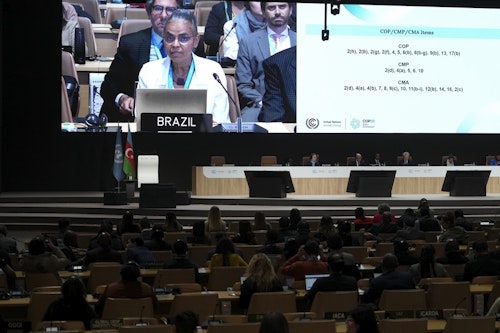
Marina Silva, Brazil environment minister, speaks during a plenary session at the COP29. Credit: AP Photo/Sergei Grits
'Time is not on our side' - COP29 President
"We have all been working very hard over the past two weeks and I know that none of us want to leave Baku without a good outcome," COP29 President Mukhtar Babayev tells the plenary as it kicks off just after 8 pm.
"The eyes of the world are rather focused on us however time is not on our side. I ask you to now step up your engagement with one another."
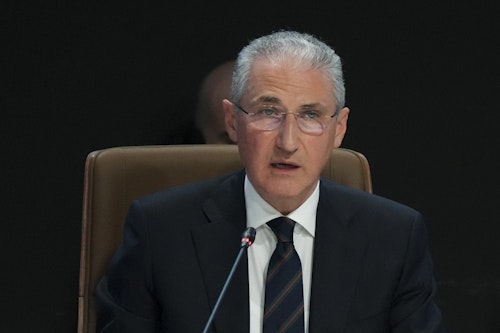
Mukhtar Babayev, COP29 President, speaks during a plenary session at COP29. Credit: AP Photo/Sergei Grits
The long-awaited plenary is now about to begin in Baku. It could (finally) be the end if countries can find a way to come to an agreement.
What happens now?
For any decisions to be made, COP29 will need what is known as a quorum - UNFCCC rules say two-thirds of Parties must be present.
But many parties have flights to catch. If too many parties head home, this quorum could be lost leading to a collapse of the talks. If there's no quorum, no decisions can be made. This is what happened at COP16 biodiversity talks in Colombia just a few weeks ago.
What happens then? Talks are suspended pending something known as a 'COP-bis' (COP 'twice' or 'again' for all you Latin nerds out there). This means a final deal could be pushed to climate talks in Bonn in the summer of next year which are a midway between COPs.
If this happens, it's likely to slow progress at COP30 later in the year. Not an ideal situation for the host country Brazil whose chief negotiator told Euronews last night that they were "really disappointed" numbers for the finance deal had come so late in the day.
After earlier indications that the closing plenary would be scheduled for 7 pm Baku time, it has now been pushed back to 8 pm. But that could change again as the situation at the summit remains unclear.
We're well into overtime now at COP29 without a definite end in sight.
EU is attempting to 'build bridges'
EU Climate Commissioner Wopke Hoekstra has said talks need to "stay constructive".
"We’re doing our utmost to build bridges with literally everyone. It is not easy, neither on finance nor on mitigation," Hoekstra told Euronews via a spokesperson.
"It is also a fair ask to stay constructive. There is no alternative to do whatever we can.”
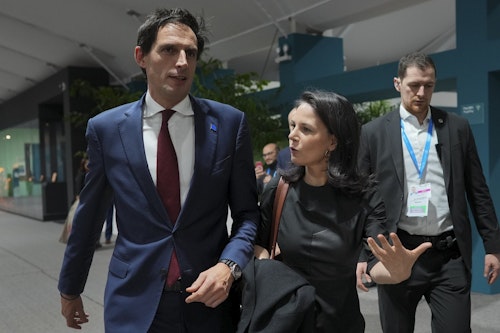
Wopke Hoekstra, EU climate commissioner, left, and Germany Foreign Minister Annalena Baerbock walk through the COP29. Credit: AP Photo/Peter Dejong
AOSIS says it is still taking part in climate talks
AOSIS chair Cedric Schuster has issued a statement clarifying that they are still taking part in the talks.
"Let me make it clear that the Alliance of Small Island States remains committed to this process and are here in the spirit of good faith in multilateralism to secure the best deal that will protect not just us, but the world from the worst impacts of climate change.
"We have presently removed ourselves from the stalled NCQG discussions, which were not offering a progressive way forward. We want nothing more than to continue to engage, but the process must be INCLUSIVE. If this cannot be the case, it becomes very difficult for us to continue our involvement here at COP29.
"Small island developing states and Least Developing Countries are among the very worst impacted by this climate crisis that we did not cause.
"Yet we have found ourselves continuously insulted by the lack of inclusion, our calls are being ignored."
A post shared by the LDC chair on social media site X, says they have "temporarily walked out but remain interested in the talks until we get a fair deal".
Addressing the press outside the meeting, Mohamed Adow of Power Shift Africa has said:
"What has happened here today is that the moral compass of the world, the most vulnerable countries on our planet, have walked out of the negotiations after the developed world failed to honour the promises they had made to provide climate finance. The rich world has refused to honour their obligations and they are effectively working to ensure they can shift their burden to the devloping countries.
The text that was put forward, instead of acknowledging the historic responsibility for climate change, pute the onus on all actors who cannot be defined and can't be held accountable.
As a result the Least Developed Countries and the Alliance of Small Island States have walked out of the negotiations and say they cannot associate themselves with the draft which was put forward by the presidency."
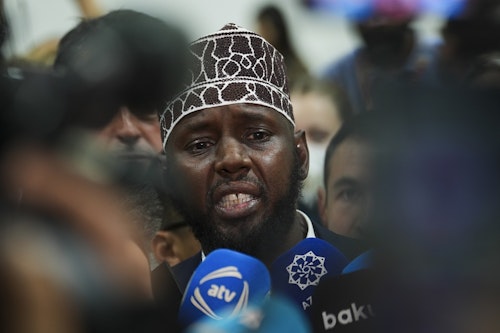
Mohamed Adow, director of the think tank Power Shift Africa. Credit: AP Photo/Peter Dejong
It's all falling apart in Baku. Tensions are high after developing nations walked out of the negotiating room. To be clear, it seems they have walked out of the finance meeting, not COP29 altogether.
If they come back, talks can continue. If they don't (and observers say developing nations are more than prepared to walk away from a "bad deal") COP29 could end with no deal.
Developing countries walk out on negotiations
Euronews's Robert Hodgson says developing countries have just walked out of the room in anger.
It seems Least Developed Countries (LDCs) and the Alliance of Small Island States (AOSIS) have suspended negotiations on the new draft of the climate finance goal. A new rough draft of the text appears to have been circulated this afternoon which was being soundly rejected by developing nations.
The LDCs bloc and AOSIS walked out because they didn't want to engage with the rough draft which reportedly contained a new core figure of $300 billion a year (up from the $250 billion in Friday's draft text). They have said they want a guaranteed 30 per cent of climate finance. One source told Euronews the G77 and China want at least $500 billion a year.
In a chaotic press conference, negotiators told reporters gathered outside the room that their "needs are known" and "they are being ignored".
Chair of the LDC group Evans Njewa said the "current deal is unacceptable for us".
When asked if the walkout was a protest, Colombia's environment minister Susana Mohamed told The Associated Press: "I would call this dissatisfaction".
'A geopolitical power play by a few fossil fuel states'
A bit earlier German foreign minister Annalena Baerbock called out rich fossil fuel emitters who she says have "ripped off" climate-vulnerable states.
“We are in the midst of a geopolitical power play by a few fossil fuel states,” Baerbock said.
"We as a European Union will not accept a deal that comes at the expense of those who suffer most from the effects of climate crisis.
"We will not allow the most vulnerable, especially the small island states, to be ripped off by the few rich fossil fuel emitters who have the backing, unfortunately, at this moment of the President."
Baerbock added that climate finance and a reduction in carbon dioxide emissions are "closely linked". She said the EU was continuing to work on building bridges.
Euronews reporter Robert Hodgson is waiting (with the rest of the world's media) outside of a high-level meeting currently taking place in Baku. Only ministers, heads of delegations and very few members of their staff are allowed in.
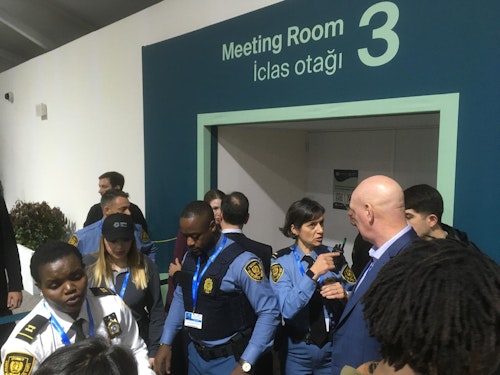
Credit: Robert Hodgson/Euronews
Civil society groups urge G77 to hold the line
Civil society groups are urging the G77 bloc of developing countries to hold the line amid what they say is a US-led effort to ensure the global finance target remains weak and unenforceable, even if it is raised at the eleventh hour.
“This is part of a decades-long effort to undermine and unwind the application of the climate regime to developed countries to get them out of their legal obligation to pay up,” said Nikki Reisch, climate and energy director at the Center for International Environmental Law.
Speaking at a protest gathering near the press room of the COP29 venue, Reish and other civil society groups repeated what has become a mantra among NGOs since the proposal that would set rich countries’ contribution to the energy transition and countering the effects of climate change to $250bn a year from 2035 – that no deal is better than a bad deal.
“We see language in there about mobilising financing from all actors and other sources,” Reisch said. “This is really part of the US effort and those developed countries behind them to shirk responsibility and to kick it over to developing countries, to the private sector, to multilateral development banks, and ultimately to future generations.”
The human rights lawyer said US negotiators were trying to shift the focus in talks towards Article 9.3 of the Paris Agreement, which deals with ‘mobilising’ finance in the global south.
“We shouldn't be fooled,” Reisch said. “Article 9.1 of the Paris Agreement is crystal clear that the global North developed countries have an obligation to provide financing.”
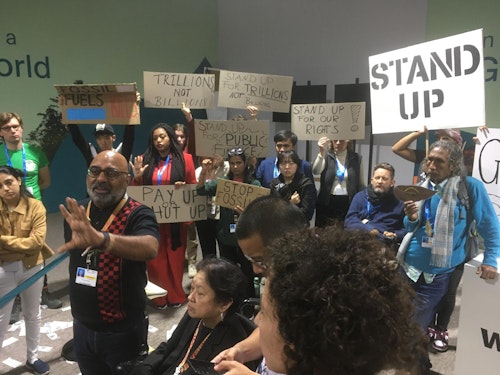
Credit: Robert Hodgson/Euronews
Asad Rehman, director of the anti-poverty charity accused the US of deliberately working to keep a number for the finance target off the table until the eleventh hour in a bid a ensure a weak result.
“But this behaviour is only enabled and it's only possible because of the complicity of developed countries like the United Kingdom, the European Union and other[s],” Rehman said. “They all know what the United States is doing, but they are staying silent.”
Progress on carbon markets
While there's still no sign of progress on climate finance, there has been movement on some of the other draft texts. Texts on carbon markets (Article 6.2/6.4) have moved to "draft decision" status.
Carbon Brief's Simon Evans says he thinks they are "not 100% but, like, 99%" agreed. They are now both what is known as "L documents" which will go to the final plenary to gavel.
Article 6 of the Paris Agreement concerns a carbon markets system, which would enable nations to produce pollution if they offset emissions elsewhere by buying carbon credits.
Are carbon markets a climate solution or excuse for more pollution?
Carbon markets are one step closer to being part of global climate plans after a speedy COP decision.
Food is also starting to run low at the COP29 venue. Euronews reporter Robert Hodgson came across what seems to be some of the last scraps left at the summit. Alas, the counter is unmanned.
Things are going to get desperate, he says.

Credit: Robert Hodgson/Euronews
A time of 7 pm today for the closing plenary (Part 1) appears on the boards at COP29, our Euronews reporters on the ground say.
Will this materialise into an actual plenary? Over the last day or so we've been given all sorts of different timings for this closing plenary. Last night the meeting board showed it scheduled for 10 pm Baku time. That, obviously, didn't happen.
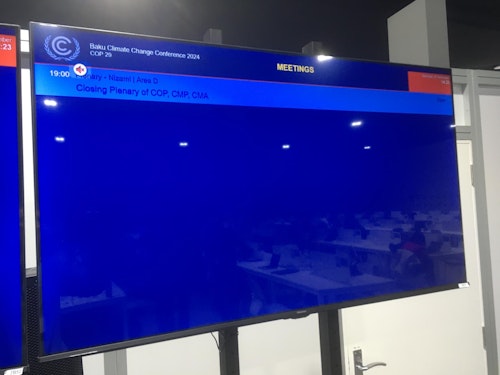
Credit: Robert Hodgson/Euronews
'We are really disappointed that the numbers came so late'
Brazil's chief negotiator told Euronews last night that the second finance bid came too late in summit, leaving doubt over whether a deal can be clinched.
“Brazil's position is that we are really still hoping that we can get into an agreement here,” Brazil’s climate envoy and lead COP29 negotiator Ana Toni told Euronews late on Friday on the sidelines of the summit.
“We are really disappointed that the numbers came so late and that we may not have enough time.”
COP 29: Brazil warns no deal unless rich states up finance targets
Brazilian chief negotiator - representing next COP host country - told Euronews second Azeri finance bid came too late in summit, leaving doubt over whether de…
Deal or no deal?
We're still waiting on any signs of movement in Baku as negotiations continue to run over.
Civil society groups have gathered inside the venue to chant "No deal is better than a bad deal". Late last night, 355 civil society organisations released a letter in support of the G77 and China negotiating group’s rejection of the latest draft.
It urged negotiators to “stand up for the people of the Global South," saying that “no deal in Baku is better than a bad deal.”
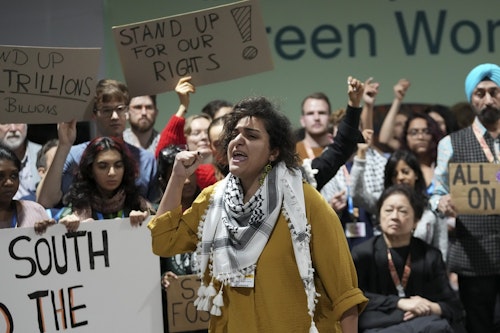
Activists participate in a demonstration for climate finance at COP29 Credit: AP Photo/Sergei Grits
That possibility is edging ever closer to reality as time goes on. A quorum of 60 delegates is needed for the elusive plenary session to actually happen. UN regulations mean COP29 can't go on indefinitely. Negotiators have been huddled in offices for much of the day attempting to hash out a new deal.
But we're currently at an impasse over the proposed $250 billion a year figure. Developing nations say it isn't enough, dismissing it as a "joke" yesterday. Some sources indicate that rich nations are now willing to stump up more cash - a figure of $300 billion has been put on the table - but even that might not be enough to reach a final deal.
Panama's negotiator Juan Carlos Monterrey Gomez told AP that even a higher figure is "still crumbs".
"How do you go from the request of $1.3 trillion to $300 billion? I mean, is that even half of what we put forth?” he asked.
The outcome of the UN climate conference now hangs in the balance with ministers from many countries due to leave tonight and tomorrow.
Last night our reporters in Baku caught this protest against the proposed deal. People walked silently through the COP29 venue with their arms crossed over their heads.
It came after poorer countries reacted with anger to the proposed $250 billion a year by 2035 deal. In a post on social media, the campaign group Demand Climate Justice said "Pay up or shut up!".
People in power are about to agree a climate crisis 'death sentence', Greta Thunberg says
"As the COP29 climate meeting is reaching its end, it should not come as a surprise that yet another COP is failing," Swedish climate activist Greta Thunberg has said in a post on X.
"The people in power are yet again about to agree to a death sentence to the countless people whose lives have been or will be ruined by the climate crisis."
The current text, Thunberg says, is full of false solutions and empty promises. And the money from Global North countries needed to "pay back their climate debt" is "still nowhere to be seen".
As the COP29 climate meeting is reaching its end, it should not come as a surprise that yet another COP is failing. The current draft is a complete disaster. But even if our expectations are close to non-existent, we must never ever find ourselves reacting to these continuous…
— Greta Thunberg (@GretaThunberg) November 22, 2024
EU accused of 'blocking progress' in Baku
EU Climate Commissioner Wopke Hoekstra has been handed a letter on behalf of Youth and Environment Europe and over 50 NGOs, urging the EU to fulfil its Paris Agreement commitments.
"We, the collective constituencies and organisations formally representing
civil society present in Baku, and with broader global civil society and
millions of members behind us, are deeply outraged in your destructive role
in creating an absolutely unacceptable NCQG draft negotiating text on this
final day of COP29," it reads.
"If this COP ends with a weak or nonexistent outcome, you will be the
ones to blame. And we will hold you responsible both here and when we go home."
Dear EU,
— CAN EUROPE (@CANEurope) November 23, 2024
If #COP29 ends with a weak or nonexistent outcome, you're among the ones to blame.
Young Europeans just handed in a civil society cross-constituency letter to @EU_Commission, calling the EU to #PayUp and fulfil their Paris Agreement commitments. pic.twitter.com/fn9m1wQjMu
When will COP29 end?
The simple answer is, we don't know! Euronews reporter Robert Hodgson tells us a Saturday finish isn't looking likely. Organisers have circulated information about food outlets staying open late tonight and into the early hours of tomorrow morning. Not a good sign for a conclusion any time soon.
Overtime isn't unusual though at COPs. Last year, COP28 ran over by 23 hours. COP27 in 2022 was the second-longest UNFCCC COP finishing more than 39 hours later than planned at around 9:20am on Sunday.
The longest-ever overrun was COP25 in Madrid which finally closed at 1:55pm on Sunday - almost 44 hours late.
A handful have wrapped up on time (or even early!) since COP1 in Berlin in 1995. COP5 in Bonn finished five hours ahead of schedule.
But that isn't the case in Baku and as the years have gone by, the trend is for the gavel to go down later and later. The last time a closing session happened as scheduled was COP9 in Milan in 2003. Could we be heading for a new record?
What's the state of play?
Welcome to the last day +1 of COP29, extra time. We are waiting for the all-important new – supposedly final – text of the agreement.
It will stipulate how much financial support rich, western countries (the EU plus Australia, Canada, Japan, New Zealand, Norway, Switzerland, the United Kingdom and the United States of America) will give developing countries to transition to low-carbon economies and adapt to changing weather patterns.
Developing countries and NGOs have dismissed as paltry the $250bn a year by 2035 put on the table yesterday.
Brazil is calling for at least $300bn, and by 2030, not 2035. As the country’s climate envoy, Ana Toni explained to Euronews yesterday, it is not only the headline figure but the wording on where the money comes from that counts.
Developing countries say they need at least $1.3 trillion to undergo a transformation in line with the Paris Agreement goal to stop global temperature rise before it hits 1.5 degrees above the average in the second half of the nineteenth century.
Latest word is the texts may well be ready, it’s just a question of when they drop.
Good morning, we're officially into overtime and progress at COP29 is still slow. Our reporter in Baku, Robert Hodgson tells us it's quiet in the conference centre today. The crowds are gone but he's still managed to find a much needed coffee.
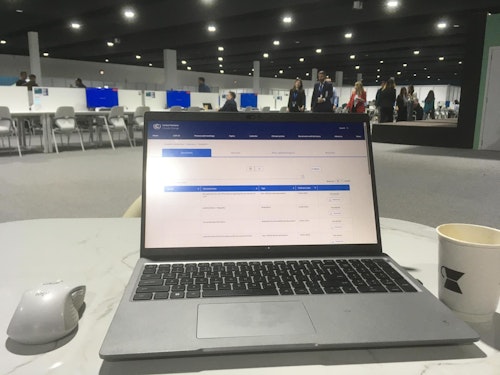
Credit: Robert Hodgson/Euronews
Join us as we head into what is hopefully the final stretch of this summit. While we wait for updates, check out what you missed yesterday.
COP29: $250 billion climate finance proposal slammed by activists
Euronews Green brings you the latest updates from the UN climate conference in Baku, Azerbaijan.











